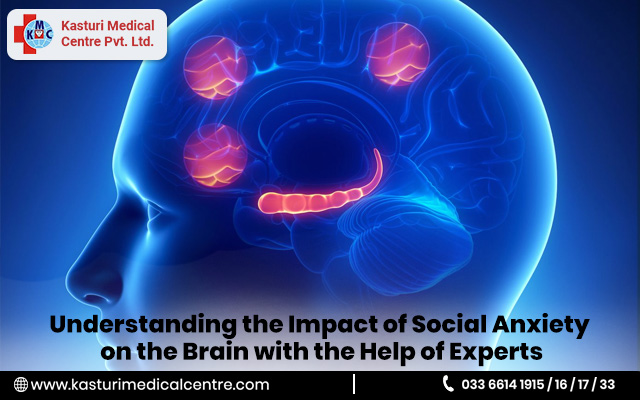Do you often confuse shyness with social anxiety disorder? Though these terms are interchangeably used, social anxiety disorder is more than shyness; it’s a mental health disorder. Medical professionals at Kasturi Medical Centre provide optimized psychology treatment types based on your condition. Read on further to understand social anxiety in more detail.
What is Social Anxiety?
Social anxiety disorder is a medical condition in which the patient experiences uncontrollable fear stemming from social situations. They fear the fact of being negatively judged by others which leads to avoidance of social situations.
Neurobiology of social anxiety
Social anxiety disorder involves complications in various parts of the brain. Some of the core brain area affected by this mental health disorder are-
- Amygdala– Amygdala is part of the brain that lights up when faced with a fearful or stressful situation. People suffering from this disorder have a larger amygdala. The size of the amygdala varies depending on the severity.
- Prefrontal Cortex– This part of the brain is responsible for planning, decision-making, and self-control. In the context of social anxiety, it plays an essential role in managing and regulating the fear response. Compared to the amygdala, it becomes smaller when suffering from severe anxiety issues making it difficult to handle emotions.
- Anterior Cingulate Cortex– This plays a vital role in regulating emotions. It acts as a bridge between the amygdala and the prefrontal cortex, helping to modulate the fear response. This channel can get disrupted during stressful conditions, making it difficult to control emotions, which can exacerbate social anxiety.
- Hippocampus- This part of the brain is involved in learning and memory. Over time, social anxiety is a behaviour pattern that people learn and adopt after getting exposed to repeated harmful incidents.
Impact of social anxiety
Social anxiety can adversely affect the brain as well as body –
- It leads to excessive sweating with increased heart rate.
- A person might become nauseous or feel difficulty breathing.
- Dizziness or lightheadedness also has a joint impact.
- Attending any social gatherings and talking to unfamiliar people becomes a rollercoaster task.
Treatment
Psychology treatment types vary depending on the severity of your case. Your active participation is crucial as your doctor conducts talk therapy to understand your issue and prescribe medications accordingly. Cognitive Behavioural Therapy (CBT) is the technique used by psychologists to process your behaviour and thinking patterns. Specific antidepressants like Selective Serotonin Reuptake Inhibitors (SSRI), serotonin-norepinephrine reuptake Inhibitors (SNRI) or Benzodiazepines are prescribed. These medications help you ease your symptoms.
Conclusion
By adopting various psychology treatment types like CBT, medications you can ease your symptoms and enhance your coping strategies, ultimately improving quality of your life and social functioning.

